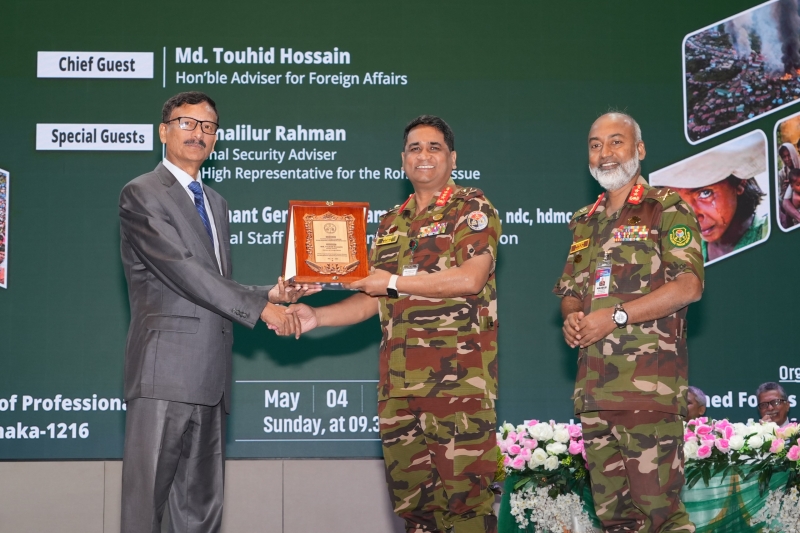- Israel Strikes Tehran with US Support Amid Nuclear Tensions |
- India Sees 9% Drop in Foreign Tourists as Bangladesh Visits Plunge |
- Dhaka Urges Restraint in Pakistan-Afghan War |
- Guterres Urges Action on Safe Migration Pact |
- OpenAI Raises $110B in Amazon-Led Funding |
Rohingya Crisis Poses Growing Regional Stability Threat: Touhid

Foreign Affairs Adviser Md Touhid Hossain on Sunday warned that the protracted Rohingya crisis poses a serious and escalating threat to both Bangladesh and broader regional stability, calling for stronger international efforts to secure a sustainable solution.
“We have yet to find a viable solution to this crisis, though it has burdened us for a very long time,” he said, noting that prospects for repatriation remain bleak due to Myanmar’s ongoing internal turmoil.
He made the remarks while addressing a seminar titled “Repatriation of Rohingyas in Bangladesh: Strategic Implications on Regional Security and Ways Ahead”, jointly organised by the Armed Forces Division (AFD) and Bangladesh University of Professionals (BUP) in Dhaka.
National Security Adviser Khalilur Rahman and AFD Principal Staff Officer Lieutenant General SM Kamrul Hassan attended the event as special guests.
Touhid Hossain described the Rohingya crisis as a “long-drawn problem” and stressed that repatriation must be voluntary and carried out with full guarantees of rights and security.
“They will not return to a place where their lives remain at risk and their basic rights are denied. At least in the camps here, they have some degree of safety,” he said.
He reminded that the 2017 influx was not the first instance of Rohingya displacement, pointing to earlier waves—including a slow but steady inflow of nearly 300,000 Rohingyas prior to 2017—highlighting the protracted nature of the crisis.
Since August 2017, over 700,000 Rohingyas have fled brutal military crackdowns in Myanmar’s Rakhine state, pushing the total refugee population in Bangladesh to more than 1.3 million, spread across camps in Cox’s Bazar and Bhasan Char. Not a single Rohingya has been repatriated in the past eight years.
Touhid criticised Bangladesh’s early reliance on bilateral diplomacy to resolve the issue, saying many—including himself—had warned such efforts would likely fail.
“This was not a sporadic eruption of violence. It was a calculated move by Myanmar’s military regime to permanently remove the Rohingyas from their territory,” he said. “We cannot abandon diplomacy or stop bilateral engagement, but we should not expect repatriation to result solely from these efforts.”
He identified Myanmar’s fractured internal political landscape—comprising the military junta, the Arakan Army (AA), and the National Unity Government (NUG)—as a major obstacle to any repatriation initiative.
Touhid stressed that any durable solution must involve all key actors, particularly the Arakan Army, which now controls significant parts of Rakhine State.
He also warned of long-term security risks posed by the prolonged displacement of over a million Rohingyas. “It is unrealistic to expect that such a large, mostly young population will remain peaceful indefinitely,” he said. “This unresolved crisis risks fuelling radicalisation and regional instability.”
Touhid urged the international community not to let the Rohingya issue be overshadowed by other global crises. “I call on all of you to remain committed and work towards a just and lasting solution,” he said.
He welcomed the recent attention shown by the United Nations, including a visit by Secretary-General António Guterres, but called for more sustained and effective global engagement.
National Security Adviser Khalilur Rahman addressed recent speculation surrounding a “humanitarian corridor” into Myanmar, calling the term “misleading” and “misused.” He clarified that Dhaka has not discussed, agreed to, or reached any consensus on establishing such a corridor, adding that even the UN secretary-general had avoided using the term.
In his remarks, AFD Principal Staff Officer Lt Gen Kamrul Hassan noted the expanding control of the Arakan Army in Rakhine and the effective absence of Myanmar’s central authorities in the region. He emphasised the importance of bilateral initiatives backed by coordinated international and regional support to resolve the crisis.
BUP Vice-Chancellor Major General Md Mahbub-ul Alam delivered the welcome address, while Professor Shahab Enam Khan, a national security analyst and international relations expert at Jahangirnagar University, presented the keynote paper.

